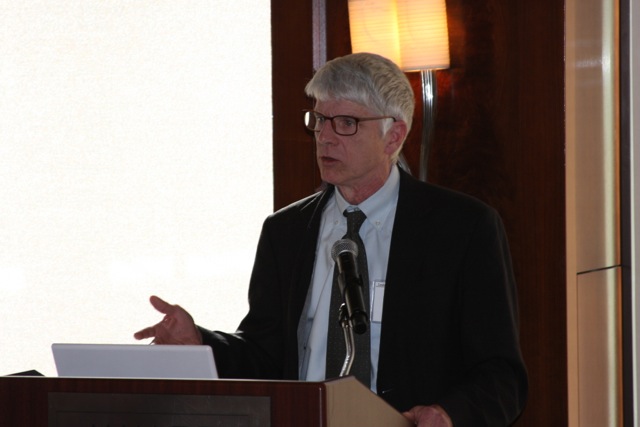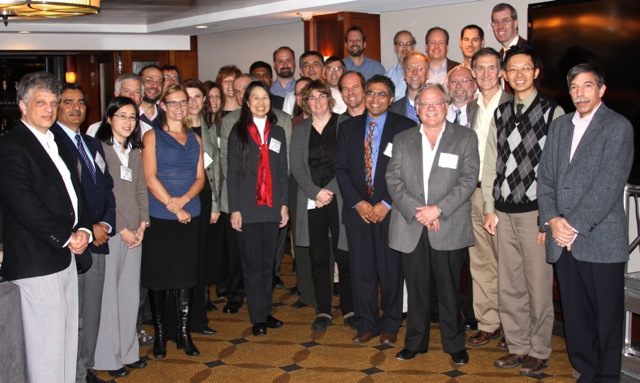![Peter Stone, UT-Austin [image courtesy UT-Austin]. Peter Stone, UT-Austin [image courtesy UT-Austin].](https://cccblog.org/wp-content/uploads/2011/11/Peter_Headshot.png) Last Monday, the Computing Community Consortium (CCC) — together with the Computing Research Association’s (CRA) Government Affairs Committee — ran its first-ever Leadership in Science Policy Institute (LiSPI). Thirty-five computing researchers from around the country came to Washington to learn about U.S. science policy. Here, one of the participants — Peter Stone, an Associate Professor in the Department of Computer Science at the University of Texas at Austin — shares his experiences in the daylong workshop.
Last Monday, the Computing Community Consortium (CCC) — together with the Computing Research Association’s (CRA) Government Affairs Committee — ran its first-ever Leadership in Science Policy Institute (LiSPI). Thirty-five computing researchers from around the country came to Washington to learn about U.S. science policy. Here, one of the participants — Peter Stone, an Associate Professor in the Department of Computer Science at the University of Texas at Austin — shares his experiences in the daylong workshop.
Scientists and politicians comprise two very different, usually mutually independent cultures. The analytical mindset that is central to the scientific process is not as pervasive in politics, where compromise and deal-making rule the day. As a result, scientists are often reluctant to engage in the political realm. But this reluctance can be very detrimental to the scientific community.
On Monday, November 7th, the Leadership in Science Policy Institute (LiSPI) was held as an effort to energize mid-career computer science researchers to play a role in influencing science policy. Sponsored by the Computing Research Association (CRA) and Computing Community Consortium (CCC), it was a one-day meeting of 35 computer science professors from universities around the country and a few researchers from industrial research labs. We met on the 11th floor of the Hyatt Regency on Capitol Hill.
An esteemed group of speakers was brought in to first motivate us to become involved in science policy, and second to teach us how to do so.
As Fred Schneider, CCC Council member and Chair of CRA’s Government Affairs Committee, told us in the first talk, and as we learned in detail throughout the day, government is complicated. In his words, if what we learned in school about the three branches was Government 101, then this was Government 601. We learned about congressional committees, agencies, budgets, staffers, lobbyists, and all of the other relevant people and organizations, as well as how they relate to one another (more after the jump…).
 The arguments for participating in the policy process essentially boiled down to 1) it’s our duty as a service activity — if nobody does it, we will all suffer; and 2) there’s a chance it will make a concrete difference in our own work environments. If that were it, I would have left confused. It’s clear that trying to influence policy takes a huge amount of work, and has a small chance of actually making a difference: high cost with small chance of concrete benefits (though admittedly the benefits can be big if you succeed as Henrik Christensen did with the National Robotics Initiative). And even when successful, you’re unlikely to get credit. But our speakers were all quite enthusiastically positive about their experiences in the world of policy. My conclusion was that there had to be a hidden benefit to tip the balance in favor of participation. I believe the benefits are personal: in networking and in enjoying the process itself. Those benefits won’t apply to, or be valued by, everyone. But as a community, it’s important that they tip the balance for enough of us that we’re well-represented in Washington.
The arguments for participating in the policy process essentially boiled down to 1) it’s our duty as a service activity — if nobody does it, we will all suffer; and 2) there’s a chance it will make a concrete difference in our own work environments. If that were it, I would have left confused. It’s clear that trying to influence policy takes a huge amount of work, and has a small chance of actually making a difference: high cost with small chance of concrete benefits (though admittedly the benefits can be big if you succeed as Henrik Christensen did with the National Robotics Initiative). And even when successful, you’re unlikely to get credit. But our speakers were all quite enthusiastically positive about their experiences in the world of policy. My conclusion was that there had to be a hidden benefit to tip the balance in favor of participation. I believe the benefits are personal: in networking and in enjoying the process itself. Those benefits won’t apply to, or be valued by, everyone. But as a community, it’s important that they tip the balance for enough of us that we’re well-represented in Washington.
Once deciding to become engaged, it’s important to know the main argument in favor of government supporting computing research. Peter Harsha, CRA’s Director of Government Affairs, laid out a convincing case that we all ought to be able to articulate on demand. In short, computing affects how we conduct commerce, how we learn, our employment, our health care, how we manufacture, how government functions, how we preserve national security, how we communicate, and how we’re entertained. It also enables changes in science and engineering. There are more jobs available than can be filled by our current supply of experts. And, importantly, many important advances are directly traceable to government programs. It’s hard to imagine a field that is more worth the investment of research money.
Next we learned how to engage: whom to talk to, when to talk to them, and how to follow up. It was too much to digest in one sitting, especially without a concrete opportunity to apply it on the horizon. For example, I’m unlikely to be called for congressional testimony in the near future. But if nothing else, we learned how to get the information we will need when we need it. The CRA is clearly an important resource for that. If/when I find myself in a position to influence science policy, my notes and contacts from this meeting will certainly be my starting point when preparing.
 A few sound bullet points that stick out as being memorable were:
A few sound bullet points that stick out as being memorable were:
- Timing is important. The best argument will have no impact if it’s not made at the time in the annual cycle when the topic in question is on peoples’ minds.
- Don’t seek credit. You succeed if your idea is implemented. But by the time it is, it will belong to someone else (or to your committee).
- New trumps improved. Similarly to research, people are more interested in new programs and initiatives than in incremental improvements to existing ones.
- The process is slow. Budgets need to be set 1.5-2 years before the start of a given fiscal year.
- The National Institutes of Health (NIH) and Department of Energy (DOE) are under-tapped as funding sources for computing research. There are lots of hidden opportunities for computation in existing NIH programs. NIH’s Biomedical Information Science and Technology Initiative (BISTI) can help find them.
- Perhaps the bottom line of the meeting was summed up by one of the speakers: “Science is only one part of policymaking. It’s only a second- or third-order aspect.”










This is an excellent summary — thank you. I think that your bullet points are spot on too, and I’d like to elaborate on one: “Similarly to research, people are more interested in new programs and initiatives than in incremental improvements to existing ones.” I think that this accurately reflects reality, and as a former NSF PD, it seemed to be the case that even when the President and Congress agreed on budget (increases?), it was for new programs, which come with additional overhead, and not for increased staff, resulting in very heavy workloads among NSF staff. I’m not sure what can be done about that, because the bias for the new seems firmly entrenched, as does the bias to not increase budgets — perhaps write your congressperson on the underfunding of science, with a reminder that that includes incremental improvements to process, as well as (truly) exciting new programs. In any case, thank you again — it sounds like a great experience.